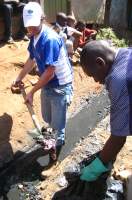- Forum
- categories
- Attitudes and behaviours
- Community-led approaches
- CLTS (Community-led total sanitation)
- Testing CLTS approaches for scalability, enhancing the role of local actors in CLTS implementation (Plan USA and Water Institute at UNC - Kenya, Ethiopia and Ghana)
Testing CLTS approaches for scalability, enhancing the role of local actors in CLTS implementation (Plan USA and Water Institute at UNC - Kenya, Ethiopia and Ghana)
23.3k views
- campbelldb
-

- A WASH Communications/Knowledge Management professional with 30 plus years of experience.
Less- Posts: 316
- Karma: 13
- Likes received: 83
Re: Global Waters Radio: Darren Saywell on Community-Led Total Sanitation
medium.com/usaid-global-waters/global-wa...itation-b4fdcd5a15d4
Communications/KM Specialist
Banjo Player/Busker
Haiku poet
Please Log in to join the conversation.
You need to login to reply- khorvath
-
 Less
Less- Posts: 2
- Likes received: 0
Re: Webinar TOMORROW 17 Dec! Engaging Local Actors in Sanitation Behavior Change: Case Studies of CLTS (10 am EST New York time)
"Thanks for your question. We have not investigated CHCs specifically, as our research focused exclusively on CLTS. Just as CLTS is context-specific and not universally applicable, the same is likely to be the case with other behavior change approaches. This is why we suggest that CLTS be considered as part of a larger toolkit, which includes efforts that have also been implemented worldwide such as sanitation marketing, CHCs, educational approaches, and even subsidies. In order to systematically answer the question, “If CLTS fails in a community, then what?”, we would have to design an experiment where different alternatives are implemented in communities where triggering has not led to behavior change and evaluate outcomes."
I have also attached a pdf of the slides used during the webinar to this response for your further reading. Best wishes,
Kris
Please log in or register to see it.
This message has an attachment file.
Please log in or register to see it.
Please Log in to join the conversation.
You need to login to reply- Elisabeth
-
- User is blocked
- Freelance consultant since 2012
Less- Posts: 3372
- Karma: 54
- Likes received: 932
Re: Webinar TOMORROW 17 Dec! Engaging Local Actors in Sanitation Behavior Change: Case Studies of CLTS (10 am EST New York time)
Dear Alec,
Thanks for posting the link to your webinar recording on the topic of "Engaging Local Actors in Sanitation Behavior Change: Case Studies of CLTS". I enjoyed listening to it - it's a bit like listening to a podcast from a radio broadcast.
The presentation by Vidya Venkataramanan was rather long but very good.
Could you please also post the slides that she used as one gets a faster overview about the content of her talk then? Thanks.
Also, I noticed that a few times she pointed out the limitations of CLTS (e.g. that it doesn't work in all rural communities for various reasons) and she said that rather "keep going back to try and make CLTS work there"), rather look for alternative approaches. Also that CLTS should be embedded in a larger toolkit. She didn't, however, say which larger approach that should be (the link with sanitation marketing was mentioned in the questions segment).
Has the team at Plan or UNC investigated using Community Health Clubs as that "wider approach" which could work in cases where CLTS alone didn't work too well? We're having a detailed discussion about that here (following a webinar where Juliet Waterkeyn presented): forum.susana.org/forum/categories/5-comm...-of-health-in-rwanda
What does your team think about that approach?
If you found that one not suitable, what are other promising approaches which could be used either in conjunction with CLTS or instead of CLTS (e.g. in villages that had a too long history of subsidies and are therefore not really suitable for CLTS triggering)?
Regards,
Elisabeth
P.S. I see that funding by BMGF for this project came to an end in Sept. 2015. Does this mean the project has now concluded or did you get follow-up funding for some components from BMGF or other sources? - Is it possible to share the final report of this project which would presumably summarise nicely how the project's objectives were reached? That would be great.
Freelance consultant on environmental and climate projects
Please Log in to join the conversation.
You need to login to reply- aks0813
-
 Less
Less- Posts: 18
- Likes received: 4
Re: Webinar TOMORROW 17 Dec! Engaging Local Actors in Sanitation Behavior Change: Case Studies of CLTS (10 am EST New York time)
Here is the link to the webinar in case you missed it (note that it starts around 06:45): sas.elluminate.com/site/external/jwsdete...2820.vcr&sid=2009099
Regards,
Alexandra Shannon
This email address is being protected from spambots. You need JavaScript enabled to view it.
Please Log in to join the conversation.
You need to login to reply- aks0813
-
 Less
Less- Posts: 18
- Likes received: 4
Re: Webinar TOMORROW 17 Dec! Engaging Local Actors in Sanitation Behavior Change: Case Studies of CLTS (10 am EST New York time)
Join us TOMORROW, Thursday, December 17th, from 10:00 – 11:00 AM EST as we share the results of implementation research on the role and potential of local actors to sustain CLTS outcomes. This research is part of the CLTS Learning Series, a collection of case studies on CLTS implementation, prepared as part of Plan International USA’s Testing CLTS Approaches for Scalability project, funded by the Bill & Melinda Gates Foundation and implemented in partnership with the Water Institute at UNC (see here on the forum: forum.susana.org/forum/categories/5-comm...a-ethiopia-and-ghana).
During the webinar, Vidya Venkataramanan, PhD candidate at the Water Institute at UNC, will present findings and implications from seven case studies across Africa, Asia, and the Caribbean, followed by 30 minutes of Q&A. Session moderation will be provided by Darren Saywell, Senior Director of Water, Sanitation, and Health at Plan International USA. We hope you will join us!
Please go here to register: waterinstitute.unc.edu/clts/webinar-registration/.
Regards,
Alec
---
Alexandra Shannon
Knowledge Management Associate
The WATER INSTITUTE at UNC
Gillings School of Global Public Health
University of North Carolina at Chapel Hill
Email: This email address is being protected from spambots. You need JavaScript enabled to view it.
This email address is being protected from spambots. You need JavaScript enabled to view it.
Please Log in to join the conversation.
You need to login to reply- aks0813
-
 Less
Less- Posts: 18
- Likes received: 4
Re: New video + learning brief from the Water Institute at UNC and Plan International Available Now!
I wanted to alert you to two new CLTS related publications on our website that may be of interest to you all:
1) A new video from Plan International and the Water Institute at UNC offers a preview of five exciting lessons on sanitation policy and practice, based on findings from operational research on CLTS in Ghana, Ethiopia, and Kenya: waterinstitute.unc.edu/new-video-offers-...-policy-and-practice.
2) In addition, we recently published a learning brief in which we review Plan International Nepal’s CLTS activities and the role of local actors in CLTS implementation: waterinstitute.unc.edu/publication/commu...entation-case-study/.
I welcome your questions!
Regards,
Alec Shannon
Knowledge Management Associate
The Water Institute at UNC
This email address is being protected from spambots. You need JavaScript enabled to view it.
Please Log in to join the conversation.
You need to login to reply- egichora
-
Less
- Posts: 1
- Likes received: 0
Re: Testing CLTS approaches for scalability, enhancing the role of local actors in CLTS implementation (Plan USA and Water Institute at UNC - Kenya, Ethiopia and Ghana)
From the recent implication workshop in Stockholm, it was clear that local actors have a role to play in scaling up CLTS.
Form the Kenya perspective, we note that the capacity building program for CLTS managers at the sub county level enhance the involvement in CLTS interventions, incorporating of CLTS in departmental work-plans. in addition the increased capacity of the government officers can lead to increased advocacy ad lobbying for resource allocation form county governments for CLTS implementation . This was there is potential for scale up if this approach can be replicated and initiated in other counties.
Please Log in to join the conversation.
You need to login to replyRe: Testing CLTS approaches for scalability, enhancing the role of local actors in CLTS implementation (Plan USA - Kenya, Ethiopia and Ghana)
Thanks for the update. Myself and the other users of this forum look forward to the results, which, as you say, would be disseminated by the end of the year.
Regards,
F H Mughal
Karachi, Pakistan
Please Log in to join the conversation.
You need to login to reply- ryanrowe
-
 Less
Less- Posts: 6
- Likes received: 1
Re: Testing CLTS approaches for scalability, enhancing the role of local actors in CLTS implementation (Plan USA - Kenya, Ethiopia and Ghana)
The work in Ethiopia, Ghana, and Kenya has generated a large amount of data which is still being analyzed, and therefore no reports have yet been made public. However, if you happen to be attending Stockholm World Water Week, some findings will be shared in an oral presentation at our CLTS seminar on Sunday August 23 at 09h00 in room FH 202. Additional findings will be shared at other events in September (a public access webinar) and October (the 2015 Water & Health Conference at UNC) this year.
The results are being submitted to journal publications before the end of the year in order to allow for peer review of the results and subsequent widespread dissemination (we hope this will be by early 2016). Please stay tuned to our project website: waterinstitute.unc.edu/clts. I will also add you to our mailing list.
Best regards
Ryan
Please Log in to join the conversation.
You need to login to reply- ryanrowe
-
 Less
Less- Posts: 6
- Likes received: 1
Re: New Research Summaries and Synthesis: Understanding the Implementation Context for CLTS
Thanks for these queries and apologies for the lengthy delay in my reply.
On grey literature, we are referring to our review of 115 documents outside of scientific/academic journals such as technical reports, case studies, and briefing notes. A summary of the review is available here and the full report is available here .
To your numbered questions:
1) Those questions are probably best answered by Plan International as our implementation partner. I will follow up with Darren and our colleagues in the country offices and see if I can generate some information to address Kim's questions.
2) Sorry to disappoint you - we have not reviewed the materials on the experience of CLTS in Bolivia and therefore not familiar with the specific circumstances there.
3) Good idea to help strengthen the wikipedia article. I will have a look and see what could be added there.
Best regards,
Ryan
Please Log in to join the conversation.
You need to login to reply- Elisabeth
-
- User is blocked
- Freelance consultant since 2012
Less- Posts: 3372
- Karma: 54
- Likes received: 932
Re: New Research Summaries and Synthesis: Understanding the Implementation Context for CLTS
Thanks for your post which provides these nice, concise, short synthesis documents about understanding the implementation context for CLTS in three countries: Kenya, Ethiopia and Ghana.
I have moved your post into the existing thread about the project by Plan USA, who has partnered with you, to provide more context. Hope that's OK by you.
From your summary 1-page factsheet (forum.susana.org/media/kunena/attachment...ynthesis-2015-04.pdf) I found particularly interesting:
Our findings also aligns with CLTS grey literature, which
commonly notes that structured monitoring would enable
insight into sustained behavior change and scale-up.
and
Our assessments revealed CLTS implementation in Kenya,
Ghana, and Ethiopia relies on financial and human resources
from non-governmental organizations (NGOs).
[...]
This aligns
with GLAAS 2014 findings, which identified substantial gaps
between political aspirations and government capacity. Where
there are many actors engaged in CLTS, the grey literature
suggests the importance of mechanisms to coordinate actors,
which this study found to be established at the national level
in Kenya and Ghana.
(interesting that you mentioned twice the term "grey literature", how come?)
So thanks very much for sharing and please post more information about your research when it becomes available.
I will also put your four documents in the SuSanA library and then link to it from the project database here:
www.susana.org/en/resources/projects?search=plan+usa
As you must be an expert on CLTS, may I take the opportunity to ask your input on three things:
(1)
Could you please take a look at the questions that Kim Anderson posted above on 18 March about this project? (I had already alerted Darren to them but he didn't reply yet; perhaps Kim's questions were also too "curvy" - but perhaps you could address some of them?).
(2)
Do you have any insights on CLTS in other countries, in particular I am interested in the question why it hasn't worked out in Latin America, for example Bolivia. Please see this thread on the forum: forum.susana.org/forum/categories/5-clts...it=12&start=12#13206 (the link should take you to Page 2 of the discussion).
(3)
And do you have suggestions for improvements to the Wikipedia article on CLTS? I have been working on it with Joe Turner and Jamie Myers and some other Wikipedia editors whom I don't know: en.wikipedia.org/wiki/Community-led_total_sanitation. Perhaps information from some publications by your institute need to be included and cited?
Regards,
Elisabeth
Freelance consultant on environmental and climate projects
Please Log in to join the conversation.
You need to login to reply- ryanrowe
-
 Less
Less- Posts: 6
- Likes received: 1
Re: New Research Summaries and Synthesis: Understanding the Implementation Context for CLTS
I've been a member of this forum for some time without posting, but have keenly observed and learned from many of the discussions. Thank you for this great resource and knowledge-sharing!
I would like to share with you four new documents being released from the Plan International USA project "Testing CLTS Approaches for Scalability" for which the Water Institute at UNC is research partner.
We conducted situational assessments of CLTS in Kenya, Ethiopia, and Ghana and share with you the findings in these new short notes, which provide a snapshot of the context for implementing CLTS in each of those countries in 2012. We also developed a one-page synthesis to illustrate CLTS-specific challenges in the context of the findings of the UN-Water GLAAS 2014 report.
Community-led Total Sanitation in Kenya, Ghana, and Ethiopia: Findings from Situational Assessments. Crocker, Jonny, Jennifer Bogle, and Ryan Rowe. 2015. The Water Institute at UNC: Chapel Hill, USA. Link: bit.ly/1EKqD00
A situational assessment can inform program planning and evaluation. We assessed national policy, institutional arrangements, and monitoring systems for CLTS in Ethiopia, Ghana, and Kenya prior to evaluations of Plan International’s CLTS projects with local actors. In three short research summaries, we present the strong national government support for CLTS and the key role played by non-government actors in implementation. Improved monitoring is needed for countries to assess program efficiency and effectiveness. The insights provide a baseline reference for CLTS policy and practice.
Community-led Total Sanitation Research Brief: Implementation Context in Kenya, Ghana, and Ethiopia. Crocker, Jonny, Jennifer Bogle, and Ryan Rowe. 2015. The Water Institute at UNC: Chapel Hill, USA. Link: bit.ly/1OSOJ0v
Contextual factors may affect how local actors influence sanitation outcomes. In 2012, prior to working with local actors in Kenya, Ghana, and Ethiopia, researchers characterized the national context for implementing CLTS in each country. This publication synthesizes the research findings and shows how they illustrate the conclusions of the UN-Water GLAAS 2014 report, as they relate to political processes, implementation, and monitoring and evaluations systems. Decision-makers may utilize the information to guide CLTS policy and strategic plans.
We would welcome questions or comments on these resources.
Thank you and best regards
Ryan Rowe
This message has attachments files.
Please log in or register to see it.
Please Log in to join the conversation.
You need to login to reply- Forum
- categories
- Attitudes and behaviours
- Community-led approaches
- CLTS (Community-led total sanitation)
- Testing CLTS approaches for scalability, enhancing the role of local actors in CLTS implementation (Plan USA and Water Institute at UNC - Kenya, Ethiopia and Ghana)








